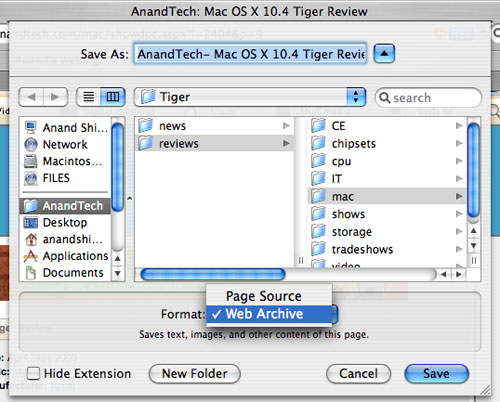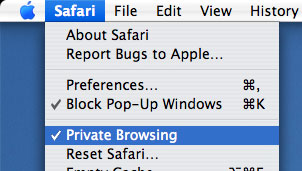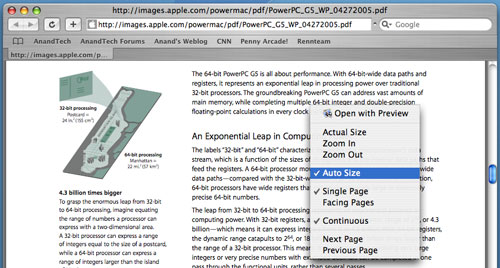Safari RSS (aka Safari 2)
In my first encounter with a Mac, I ragged on Safari for being a major disappointment under OS X; the browser looked great and was very user friendly, but it was sluggish and had a handful of annoying incompatibilities. With Tiger, Apple ships an updated version of Safari called Safari RSS.As its name implies, Safari RSS now allows you to read RSS feeds directly within the browser. Safari's integrated RSS reader is easy to read, well laid out, and works well within the Safari interface. I haven't really caught the RSS bug just yet, but Safari's implementation is quite nice. The only problem I have with it is that if a site offers more than one RSS feed, there's no way of accessing any but the first RSS feed listed in the site's code (Firefox will let you subscribe to any of multiple RSS feeds off of a single site without any problems).




Shortly before Tiger's official ship date, Apple released a brand new update of Safari for Panther users - Safari 1.3. Safari 1.3 (a part of OS X 10.3.9) offered some major improvements, mostly in the areas of performance and stability. The latest version of Safari finally solved the vast majority of my performance complaints about the browser, and as you would expect, Safari 1.3 under Panther performs quite similarly to Safari RSS under Tiger.
There are many cases now where Safari is actually faster than Firefox, but there are still some situations where Firefox is faster. What is most important is that Safari no longer feels like a slow browser, which greatly contributes to the subjective take on how fast modern day Macs happen to be - an area of weakness that can use any sort of improvement as is possible.
Safari's compatibility has come to bother me on a few occasions. Although, all of the sites that originally had Safari incompatibilities when I first started using the browser about a year ago have since been fixed. There still continue to be day-to-day incompatibilities with Safari; whenever I visit a website and things don't work exactly the way that I'd assume they would, I first have to open the page in Firefox to make sure it's not Safari causing the problems. This usually is a problem whenever I'm ordering something online or filling out any sort of form using Safari. If the submit button doesn't do anything or I get an error telling me that I didn't fill something out, yet I clearly did, then I know that I've been hit with another Safari incompatibility. For the most part, I'd say that Safari works fine on 100% of the sites that I read on a regular basis; however, it's the random sites or the times when I'm using sites that I rarely use that I sometimes encounter incompatibilities. They are annoying, but it's something that I've come to live with.
By far, the biggest problem with Safari that I've had is that the browser crashes, a lot, with certain web pages. Sometimes the crashing appears to be related to Flash; other times, it appears to be Javascript related and then there are other times when I can't even begin to pinpoint why it crashes. The problem seemed to have developed over time (possibly being made worse by subsequent OS X patches or just seeming that way by increased use of the browser), but it is definitely present on all systems. One thing that makes it difficult to diagnose is that I often have a large number of tabs open at once, and any one of those tabs could cause the instability. Needless to say, losing all open Safari tabs is a bit of a pain, and it's unfortunately something that hasn't been completely fixed in Safari RSS, but it does seem to have been somewhat addressed. I've only had a couple of crashes on the final version of Safari RSS and I've been using it a lot in preparation for this review.
I've mentioned in previous articles that I've always stuck with Safari because its look, feel and behavior matched what I'd expect from all other OS X applications. With Safari RSS, the decision to use Safari over something like Firefox or Camino (both of which I keep installed) is much less of a tradeoff. I only wish that Apple would add support for "find as you type" to Safari - it's the one feature that I truly do miss from Firefox.










55 Comments
View All Comments
pecosbill - Monday, May 16, 2005 - link
As for your comments on the bugs in the initial release, I couldnt' agree with you more. Apple seems to have taken a page from Microsoft whereby only critical bugs are fixed for a .0 release. The other thing to consider is Apple relelased new hardware around the same time. My new 2.3DP G5 came with Tiger pre-installed. Apple used to have a strict tie between hardware and OS so any delay in Tiger would delay the hardware. I'm rather sure that has decreased now, but they may rather not support the older version of the OS on newer hardware as that raises costs due to compatibility testing requirements.pecosbill - Monday, May 16, 2005 - link
msva124 - Thursday, May 5, 2005 - link
>NeXT and NeXT step succeeded in the markets where it succeeded.In other news, among stocks that went up yesterday, stocks were up.
JAS - Thursday, May 5, 2005 - link
OS 10.4 has already exceeded my expectations.I was a little hesitant to install the new OS on my two Macs until the first update (10.4.1) is released. But today, I installed Tiger on a secondary drive in my dual processor G4 desktop Mac. I was pleased with the boost in overall system performance and did not encounter any software incompatibilities. So, I installed 10.4 on my G4 iBook, too. No problems there.
The first improvements I noticed are with Safari and Finder operations. Dashboard, Spotlight and the new iChat AV are very cool. I just played a high-definition QuickTime movie trailer for the first time. The image quality is spectacular on my Cinema Display.
I've upgraded QuickTime 7 to "Pro." I like how you can now record audio directly within QuickTime.
Although there's room for improvement in certain areas, I think Apple has done a fabulous job with Tiger. I'm looking forward to seeing what the incremental 10.4 updates will bring over time.
CindyRodriguez - Wednesday, May 4, 2005 - link
Ah, I almost forgot:"The "foundation" for OS X was kind of forced into play, you know...;) And, it was years late and initially very lacking in promised features (many of which it still lacks.) "
You really have no idea what you are talking about do you?
How was it forced into play? Because Apple chose it over BeOS? Because Apple recompiled OpenStep for PowerPC? Because Apple came up with Carbon libraries to seamlessly run classic Mac OS Software in OS X natively with almost zero changes to code? Man did they force that sucker in.
What I really wanted to ask you was, what features are still missing? What was promised at the purchase of NeXT but hasn't been delived yet?
Finally, how was it years late? You are specifically talking about the NeXT/OpenStep core as far as I can tell. Are you talking about the first OS X Server release which was way more NeXT than the current OS X distribution (which has a FreeBSD core)? Or are you just talking out your butt again and confusing Copeland with NeXT and FreeBSD?
Considering that Apple bought an OS that didn't even have SMP support because a MAJOR library in the development environment wasn't threadsafe and they almost completely reworked it into the basis of today's OS X in a couple years.. I think that's pretty damn timely, don't you?
CindyRodriguez - Wednesday, May 4, 2005 - link
WaltC:Do you believe all the crap you write?
How many times to people have to point out to you that MICROSOFT was the one who started all the Tiger/Longhorn comparisons? Blame freaking Jim Alchin for comparing his vaporware to Apple's soon to ship OS. (BTW, last time I heard, WinFS was scrapped)
Also, NeXT didn't "fail". it was bought by Apple. It certainly wasn't the company it was intended to be when Apple bought it but it wasn't out of business.
"Oh yes--I suppose that's why the board fired him in '85...;) "
That was an internal power struggle that Jobs lost. I'm not even sure what your point was? Perhaps you wanted to point out how well Apple did after Jobs left?
"Both NeXt and NeXTstep failed commercially as I recall. The "foundation" for OS X was kind of forced into play, you know...;) And, it was years late and initially very lacking in promised features (many of which it still lacks.) "
Um, no. NeXT and NeXT step succeeded in the markets where it succeeded. I bet that's hard for you to grasp but let me break it down. NeXT and OpenStep specifically provided a great development environment and it took of in industries that had a lot of internal custom code. From what I had heard, NeXT, NeXTstep and OpenStep were still very pervasive in the Chicago Stock Exchange well well after the heyday of NeXT pretty much up until Apple's buyout. (OS2 actually had a similar but smaller phenomenon)
"Ah, yes, the RDF again...;) The truth of course is that *nobody knows* what Longhorn will be since Longhorn is a long way out. I see nothing wrong with a Tiger-x64 comparison because MS is *shipping* x64. Pretty simple, really. "
Hmn, good point. I KID. It really was a dumb point.
Microsoft just held a week long conference called WinHEC that focused on guess what? Come on walt, Guess. Do It.
YES!! The focused heavily on Longhorn. In fact, I've hearn no real news out of it other than Longhorn. Gee, I wonder how people (like Jim Alchin) can even compare Longhorn to Tiger considering how tight lipped Microsoft is being about Longhorn features. I mean, aside from the regular info, the early build to developers, and the week long Longhorn love fest a couple weeks ago, we know absolutely nothing about it.
On the other hand, there is the Windows64 comparison argument. Of course, that's pretty dumb too since I don't know of a single feature difference between XP64 and XP-SP2 aside from 64bit libraries. There's also that problem where MS won't even release XP64 for retail sales because driver support is still so crappy.
Other than those few point and all the other ones covered by a dozen other people, I found your comments very enlightening.
Cindy.
rsfinn - Wednesday, May 4, 2005 - link
From page 2: "With Macs, since there's no exposed boot menu, you have to hold down the "c" key while starting your machine to tell it to boot from whatever is in the CD/DVD drive."This works, but most users will never do this -- they'll insert the DVD and double-click the icon labeled "Install Mac OS X". This will set the computer to boot off the DVD and put up a dialog with a "Restart" button. After the installation is finished, the computer will be reset to boot off the partition on which Tiger was installed. No muss, no fuss.
rsfinn - Wednesday, May 4, 2005 - link
From page 3: "I definitely didn't see a single build that was released to developers that was 100% bug free ... with no public beta, and if the bugs aren't getting fixed in the developer release, then who's there to tell Apple when stuff isn't working right in Tiger?"Well, you, Anand, for one. "Beta" is supposed to mean "early access so developers can test the OS against their applications and report problems". Did you report any of the problems you saw in those prerelease builds? Or did you join the developer program just to get early access to the next cool thing?
I'm picking on Anand here to point out this wider misconception about beta software -- even public betas; as a software developer myself it's annoying to me that most people think "public beta" means "I get to play with it for free". If people don't report problems, how can they get fixed?
WaltC - Tuesday, May 3, 2005 - link
#39 "Most of what you said is ridiculous."That's only because you don't really understand what I said at all...;)
#39 "First of all, Apple's market share is growing. Of course other platforms sales aren't Apples sales. But most other sales aren't either Apple/Sun, etc."
Apple's current market share--growing or not--is still ~80% below what it was a decade ago, in terms of percentage. One significant sign of this is the fact there are very few if any Mac-only development houses left in the world today. As I pointed out, the market as a whole is still growing and the fact is that *everybody's* unit numbers are rising because of it. Increased unit sales only counts for increases in market share when they exceed the growth of the market as a whole.
#39" This is mostly an Apple/Wintel market. Sun is only servers and Apple doesn't compete much in their space yet. Apple's server sales are increasing, but are only now ramping up. Except in the scientific Unix space, Apples server sales would be against Windows servers. They don't yet have the breath to compete in the higher areas yet."
Yes, in the Apple/Wintel market it's Wintel ~97%, Apple ~3%.
#39 "Otherwise, it's Apple vs. MS."
Impossible, since the vast bulk of Apple's earnings come from its hardware sales, and MS doesn't sell personal computers of any type (unless you want to count xBox, which would be silly, imo.)
#39 Sure, other pc companies, or rather company (Dell) are growing, but that takes sales away from each other. Apple's increase in marketshare takes away from the Windows market itself. If Dell takes sale from Gateway, it's still a sale for MS. That's the point."
First you say it's an Apple/Wintel market, then you say that every Apple sale is a bite out of Wintel, and then you say that people buying Wintel instead of Apple doesn't even affect Apple sales--which seems to me very much an RDF sentiment if I've ever heard one. If you think a great number of people do not consider and then reject Apple in favor of going Wintel, you are definitely an RDF sufferer...;)
#39 "I suppose that Apple is taking away a few Linux sale as well, but it's almost all MS's."
Have you ever stopped to consider how many Linux sales take bites out of the Apple? For you folks it's always a one-way street where Apple gains but never loses...;)
#39 "All AMD did was to finally come out with better processors that they could actually make, rather than just announce, and then NOT make."
'All AMD did...'--as if it was trivial...;) All AMD did was face a juggernaut with little more than a slingshot for a long time--and manage to win, over and over again. Heh...;) You're funny. The only company you don't trivialize is, of course, Apple...;)
#39 "Apple does directly compete with MS on the OS front. Apple has always had different hardware. When Apple went to the 68000 rather than the 8088 way back when, there were few arguments that the 68000 was not a better chip. Apple simply went on through from there."
You do not understand that an Apple OS *requires* and Apple-branded box *exclusively*. A MS OS will run on boxes manufactured by hundreds of companies around the world--and none of those boxes are made and sold by MS. It's very simple. That's precisely why its a ~97% to 3% market share split, if you haven't figured it out.
39 "If Apple were to change to an x86, then every program would have to be redone. That would be almost impossible for the many Mac developers out there . It's just like the Itanium. Little software development has been done for it. Why should Apple be caught in that trap?"
Itanium is a cpu. OS X is software. FYI, the foundation for OS X, NeXTStep, has *already* been done for x86--years before OS X shipped. "The many Mac developers out there" (heh) could still develop for the Mac since presumably Apple would still sell Macs while releasing an x86 version of its OS *at the same time* which might well attract *many more developers* than Apple presently has.
Last, as noted, the split is *already* ~3% Apple versus 97% x86--so the current situation is not *much different* from the poor Itanium allegory you tried to use, is it?
msva124 - Monday, May 2, 2005 - link
Sorry, it was a dumb mistake. I don't think you are a troll anymore.>If Apple isn't taking away from the Windows market, then which market is it taking away from?
Every sale made by apple doesn't necessarily take away someone else's. There are many users who are more or less satisfied with their current setup of 1 PC, yet decide to go ahead and buy a Mac to complement it. Had Apple not existed, they wouldn't have bought another PC, they would have just stuck with their current setup. So in this case, Apple gains one sale, but PC makers do not lose any. Obviously this is not the case all of the time. The situation is more complex than saying "for every sale made by apple, pc makers lose a sale" or vice versa.